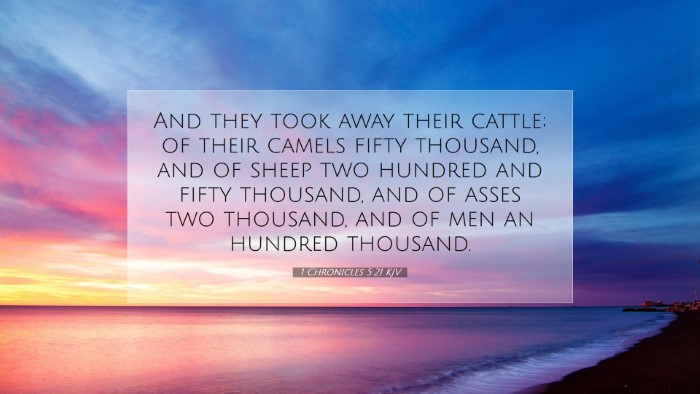Commentary on 1 Chronicles 5:21
Verse: "And they dwelt in their steads until the captivity." (1 Chronicles 5:21, KJV)
Introduction
The fifth chapter of 1 Chronicles outlines the genealogies and the historical context of the tribes of Israel, specifically focusing on the tribe of Reuben. Verse 21 emphasizes the occupation and settlement of Reuben's descendants in their designated territories until the time of their captivity. This verse connects historical narrative with theological implications regarding faithfulness, God's promises, and the eventual consequences of disobedience.
Historical Context
According to Matthew Henry, the entailed history of the tribes serves to remind readers of God's providence throughout Israel's history. The mention of the Reubenites dwelling in their "steads" signifies their place of inheritance, a theme prevalent in the Old Testament. This reflects God's promise to the patriarchs and the fulfillment of His covenant with Israel.
- Genealogical Significance: The capturing of the genealogy emphasizes the importance of lineage and heritage in Israelite culture.
- Historical Setting: The verse situates the tribes in the broader narrative of Israel's settlement in Canaan and their subsequent trials.
Thematic Elements
Adam Clarke points out that the settlement until the captivity illustrates a period of relative peace and stability followed by the eventual calamities resulting from the Israelites' disobedience. This serves as a cautionary reminder of the effects of sin and the need for faithfulness to God's commandments.
The Promise of Inheritance
In reference to God’s promise to Abraham, Isaac, and Jacob, the occupation of land represents divine fulfillment. Albert Barnes notes that their dwelling in these lands symbolizes God's faithfulness to His covenant, despite the challenges that followed due to Israel’s failures.
Consequences of Captivity
This verse foreshadows the captivity that would affect all of Israel, including the Reubenites. It serves as a sobering reminder of spiritual decline leading to physical displacement. The captivity can be seen both as a consequence of disobedience and as a means of calling the people back to repentance.
Theological Implications
This brief statement in 1 Chronicles serves as a microcosm of the larger story of Israel's relationship with God. The steady dwelling can be contrasted with the eventual exile. It highlights key theological themes such as:
- Divine Providence: God's continued presence and leadership in Israel's journey.
- Judgment and Grace: Acknowledgment of God's justice in response to Israel's waywardness, as well as His continual call to repentance.
Lessons for Ministry and Scholarship
For pastors and theologians, this verse invites reflection on the importance of stewardship over what has been entrusted to the Church today. It raises the question of how modern Christians inhabit their faith, urging an inquiry into living faithfully within their "steads".
- Faithfulness in Stewardship: Encourage believers to be faithful in their spiritual endeavors, cultivating a deep and abiding relationship with God.
- Remembrance of God’s Faithfulness: Reflect on periods of stability as God’s provision, affirming the necessity of remembering God's past actions in the lives of His people.
- Response to Disobedience: Challenge congregations to address areas of neglect within their spiritual lives, lest they experience similar consequences as seen in Israel's history.
Studying 1 Chronicles 5:21 invites deeper engagement with the spiritual and practical implications of God's promise. It is a reminder to dwell richly in God’s presence and to evaluate how personal and communal disobedience can lead to displacement, both spiritually and physically. This serves as an exhortation to pursue holiness and attentive living in faith.
Conclusion
This verse, though simple in its historical context, carries profound implications for understanding God's faithfulness, the nature of obedience, and the consequences found in the narrative of Israel. It beckons contemporary readers to uphold the lessons of Israel's past as significant teachings for personal faith and collective worship.


